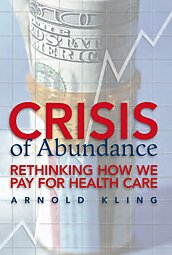“His book is clear, concise, and eminently readable; he writes in straightforward English prose, not economic jargon; he is modest, posing questions more often than he answers them; and he considers alternatives to most of the policy options he discusses. I warmly recommend his book to general readers who want to understand what economics has to say about health care.”
—Arnold S. Relman, M.D., Harvard Medical School, writing in The New England Journal of Medicine [Full text of review]
“This is one of the most important books written on health care.”
– Tyler Cowen, Economist and New York Times columnist
“Crisis of Abundance is full of useful insights, the best being Kling’s schema for understanding the value of medical care. Kling offers some innovative ideas on how to introduce more consumerism into health care. It is ideas like these that will move us toward a more market-based system of health care and save us from the disaster that is a single-payer system.”
—David Hogberg, The American Spectator [Full text of review]
“For a fresh analysis of health care, people ought to look to economist Arnold Kling’s new book, Crisis of Abundance. Although it offers no easy villain-versus-hero narrative or solution to the challenges of funding health care, it diagnoses the problem with precision.”
—Sally Pipes, National Review Online, President of the Pacific Research Institute
“I enjoyed the book’s explanation of how various economic factors play out in American medicine. Kling wishes to raise the level of understanding of the realities, issues, and tradeoffs in health-care financing. I believe he has accomplished this, and I definitely have learned much from reading his book.”
—Mark J. Kellen, M.D., Journal of American Physicians and Surgeons
Read the full review.
“This is a lucid and persuasive bookone of the most accessible guides I have ever seen to what is wrong with our health care system and how we might fix it. People of all ideological persuasions will find it enlightening and helpful.”
—Daniel Shaviro, Wayne Perry Professor of Taxation, New York University School of Law, author of Who Should Pay for Medicare?
“Crisis of Abundance pinpoints precisely where our health care spending has gone wrong. An emphasis on high-cost ‘premium medicine’ of marginal benefit, coupled with consumers shielded from its cost, has left us spending more for less. But Kling does more than offer criticismshe also offers solutions. It’s the Back to the Future of healthcare economics.”
—Sydney Smith, publisher of Medpundit (www.medpundit.blogspot.com)
